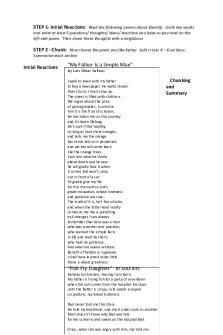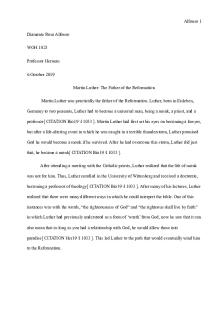Latham v. Father Divine PDF

| Title | Latham v. Father Divine |
|---|---|
| Course | Trust and Estates |
| Institution | Touro College |
| Pages | 2 |
| File Size | 72.3 KB |
| File Type | |
| Total Downloads | 80 |
| Total Views | 132 |
Summary
Trust & Estates 2019 Fall course; Casebook: Dukiminier - Case Brief and Lecture Notes...
Description
Duress Fraudulent failure to execute: if the fraud causes the decedent not to execute a will that he or she otherwise would have, although the court will not execute the will for the decedent, the court can impose a constructive trust on the parties who take the decedent’s probate property and order the property distributed to the parties who would have taken the property had the decedent execute the will that the misconduct prevent the decedent from executing. Constructive trust: the practical effect of this remedy is to give effect to the will that the decedent did not execute. The constructive trust remedy is rare, but the courts have imposed, where appropriate, to prevent unjust enrichment by those who would otherwise receive the decedent’s property. As a general rule: the unjust enrichment must result from some party’s misconduct. Example: Latham v. Father Divine- testatrix’s will left almost all of her estate to father divine. The plaintiffs alleged that the testatrix’s intended to revoke the will and execute a new will leaving her estate to them, but the testatrix was prevented due to father divine and his follower’s fraud, undue influence, and physical force. The court ruled that the plaintiffs complaint stated a case for relief in equity, and if proved, entitled the plaintiffs to a constructive trust ordering the beneficiaries under the testatrix’s will to transfer the property to the plaintiffs. Latham v. Father Divine (1949) Facts: o Plaintiffs, are first cousins but not distributees(next of kin) of Mary Sheldon Lyon, who died in October 1946 leaving a will, executed in 1943 which gave almost her whole estate to defendant Father Divine, leader of a religious cult and 2 corporate defendants in some way connected with that cult and to an individual defendant said to be one of father divines active followed o Defendants prevented the deceased from executing her new will that would have left the plaintiffs and that defendants conspired to kill and did kill the deceased by means of a surgical operation performed by a dr engaged by the defendants without the consent or knowledge of any of the decedents relatives Plaintiffs argument: o The plaintiffs alleged that the testatrix’s intended to revoke the will and execute a new will leaving her estate to them, but the testatrix was prevented due to father divine and his follower’s fraud, undue influence, and physical force Appellants argument: they rely on the case Riggs v. Palmer *this is not a proceeding to probate or establish the will which plaintiffs say testatrix was prevented from signing.. the will mary lyon Sheldon did sign has been probated and
Plaintiffs are not contesting, but proceeding on, that probate, trying to reach property which has effectively passed thereunder. Opinion: the answer is in Ahrens v. Jones The judgment of the appellate division, insofar as it dismissed the complaint herein, should be reversed, and the order of special term affirmed, with costs in this court and in the appellate division...
Similar Free PDFs

Latham v. Father Divine
- 2 Pages

The Divine Comedy Divine Comedy
- 2 Pages

Loa to Divine Narcissus Analysis
- 3 Pages

Father and son essay - A
- 2 Pages

The child is the father of man
- 1 Pages

3.2 My Father Is a Simple Man
- 3 Pages
Popular Institutions
- Tinajero National High School - Annex
- Politeknik Caltex Riau
- Yokohama City University
- SGT University
- University of Al-Qadisiyah
- Divine Word College of Vigan
- Techniek College Rotterdam
- Universidade de Santiago
- Universiti Teknologi MARA Cawangan Johor Kampus Pasir Gudang
- Poltekkes Kemenkes Yogyakarta
- Baguio City National High School
- Colegio san marcos
- preparatoria uno
- Centro de Bachillerato Tecnológico Industrial y de Servicios No. 107
- Dalian Maritime University
- Quang Trung Secondary School
- Colegio Tecnológico en Informática
- Corporación Regional de Educación Superior
- Grupo CEDVA
- Dar Al Uloom University
- Centro de Estudios Preuniversitarios de la Universidad Nacional de Ingeniería
- 上智大学
- Aakash International School, Nuna Majara
- San Felipe Neri Catholic School
- Kang Chiao International School - New Taipei City
- Misamis Occidental National High School
- Institución Educativa Escuela Normal Juan Ladrilleros
- Kolehiyo ng Pantukan
- Batanes State College
- Instituto Continental
- Sekolah Menengah Kejuruan Kesehatan Kaltara (Tarakan)
- Colegio de La Inmaculada Concepcion - Cebu









